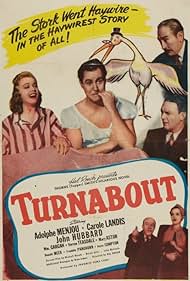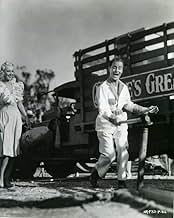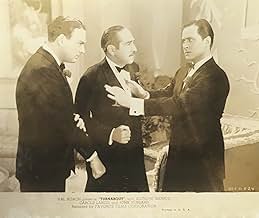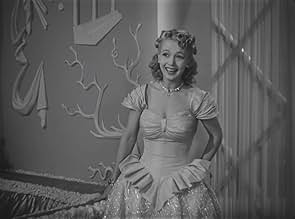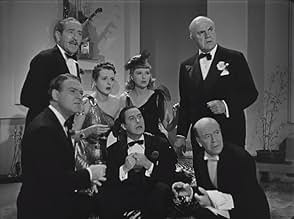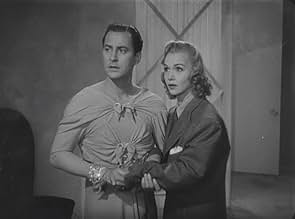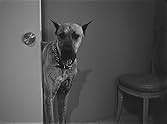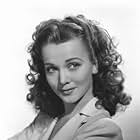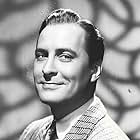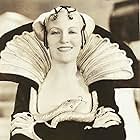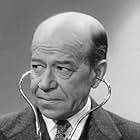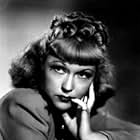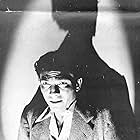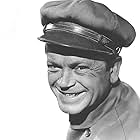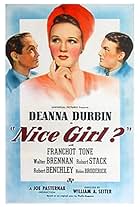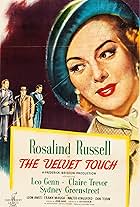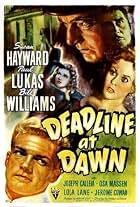VALUTAZIONE IMDb
6,1/10
819
LA TUA VALUTAZIONE
Aggiungi una trama nella tua linguaBickering husband and wife Tim and Sally Willows mutter a few angry words to a statue of Buddha and wind up living each other's life.Bickering husband and wife Tim and Sally Willows mutter a few angry words to a statue of Buddha and wind up living each other's life.Bickering husband and wife Tim and Sally Willows mutter a few angry words to a statue of Buddha and wind up living each other's life.
- Regia
- Sceneggiatura
- Star
Recensioni in evidenza
A mystical bust of a turbaned god gives a bickering, unsatisfied married couple exactly what they want: they switch bodies...but unfortunately not voices, which means the husband--who is one-third of a partnership in a big city advertising firm--talks like a girl and prances around his office complete with pocketbook! Very early entry in the body-switching genre is much fresher than some of the similar comedies which followed years later; the film doesn't have an esteemed reputation, so it's difficult to imagine that it influenced other pictures, but surely this was the starting point (or close to it). There are some very fast, very funny lines, quick and efficient gags, bright performers--however the first thirty minutes (a straight satire on big business before the 'magical' troubles begin) is just fine all by itself. The body-switching ploy pretty much comes out of nowhere and sticks out as a gimmick, when actually the movie was progressing very well without it. **1/2 from ****
This Hal Roach production from 1940 is a great comedy with outstanding actors and plenty of laughs. There is a sex change and body swapping between a husband and wife, the wife role is played by Carole Landis,(Sally Willows), "I Wake Up Screaming" and the husband is performed by John Hubbard, (Tim Willows). These two married couples have a statue of a Buddha which has magical powers and seems to be getting tired of this couple arguing about each other, so he offers this couple a chance to change their sex in order for the wife to perform her husbands duties at the office and the husband will perform the duties of the wife at home. In this household there is a great Dane dog and a bear cub running all around their dwellings. Sally Willows even climbs a flag pole in order to put up an Aeriel. William Gargan, (Joel Clare) and Mary Astor gave great supporting roles. Carole Landis gave a great performance through out the entire picture and was very young and beautiful in this film.
Bickering husband and wife (John Hubbard, Carole Landis) have their minds switched thanks to a magic statue they call Mr. Ram. Landis is gorgeous, funny, and the primary reason to recommend this movie. Hubbard is OK but nothing special. The supporting cast includes Donald Meek, William Gargan, Franklin Pangborn, and Marjorie Main. Solid supporting actors all. Mary Astor appears in a wasted role as a friend of Landis' before The Maltese Falcon would reinvigorate her career the following year. Adolphe Menjou is annoying as a partner in the husband's ad agency. His entire role in the movie is yelling at various people. It gets old fast.
The madcap stuff doesn't really get underway until about midway through. The first 35-40 minutes is mostly setup, establishing these two characters' personalities and relationships. This probably could have been trimmed down to 10-15 minutes and I believe it would have helped the movie considerably. Everything involving the dog and then the bear was completely irrelevant and seemed to be tacked on because someone thought "Hey! Animals are funny. Let's do that." The first half is a slog to get through but the second half is lots of fun. I saw it years ago and didn't like it but just saw it for a second time and came away with a more favorable opinion. It's a very unique and risqué film for 1940. Carole Landis fans will love it most. It's probably her best role.
The madcap stuff doesn't really get underway until about midway through. The first 35-40 minutes is mostly setup, establishing these two characters' personalities and relationships. This probably could have been trimmed down to 10-15 minutes and I believe it would have helped the movie considerably. Everything involving the dog and then the bear was completely irrelevant and seemed to be tacked on because someone thought "Hey! Animals are funny. Let's do that." The first half is a slog to get through but the second half is lots of fun. I saw it years ago and didn't like it but just saw it for a second time and came away with a more favorable opinion. It's a very unique and risqué film for 1940. Carole Landis fans will love it most. It's probably her best role.
Turnabout is the story of a married couple who bickers more than anyone you've ever seen. Mr. Willows (John Hubbard) and Mrs. Willows (Carole Landis) lead separate lives, and come home to fight about it. Mr. Willows is a partner for an advertising company and Mrs. Willows gossips and plays bridge with the other partners' wives. But there is one thing they can agree upon; they would love to switch lives with each other. A mysterious statue in their bedroom grants their request, and off he goes in a dress and off she goes prancing around in a suit. To say that their acquaintances are surprised would be an understatement and hilarity ensues.
Also appearing are famous names like Adolphe Menjou, Mary Astor, Inez Courtney, and Marjorie Main.
Stories like this are always entertaining, and when comedies are made on the Hal Roach lot, you're bound for success. This little known gem holds plenty of laughs, but it also abounds with a lightheartedness that can cheer anyone up on a bad day.
Also appearing are famous names like Adolphe Menjou, Mary Astor, Inez Courtney, and Marjorie Main.
Stories like this are always entertaining, and when comedies are made on the Hal Roach lot, you're bound for success. This little known gem holds plenty of laughs, but it also abounds with a lightheartedness that can cheer anyone up on a bad day.
Although not a great film this is never the less, in its own way, unforgettable. The first section of the film plays as a light comedy and is amusing enough. As soon as the gender reversal fun begins, however, it moves into a different league - one which startles by the casual way it plays with sexual expectations and stereotyping.
The Willows' transformation (through the creaky genie device) is potentially explosive stuff and, to his credit, Roach successfully steers an innocent course between pantomime and farce. Although the sexual naivety of the film is obvious, to modern eyes the homosexual/lesbian resonance of the scenario is still very funny and, for its time, I think rather daring. Hubbard's fey alter ego especially is a joy to behold, and I am surprised that this film is not better known to lovers of gay camp.
Some elements of the supporting plot reinforces the echoes of sex and gender play too: the mix up with the pets for instance, prefiguring later confusions over role, or Willows' over-aggressive personal trainer, whose grappling is suggestive of an unwanted sexual encounter. Even the running joke of hiding drink from the wife suggests a furtive vice, again particularly apposite in context.
Menjou and Landis lend a touch of class to the proceedings, and although studio-bound, and not particularly realistic in scale, the set design is elegant and spacious. The otherwise (to me) unknown John Hubbard reminds me of Ed Wood in Glen or Glenda - it's that sort of film, where men slip on Angora sweaters and then light a pipe.
This is a project that is more successful exactly because it is directed by comedy veteran Roach. It would have perhaps emerged as a far safer, and therefore far less enjoyable vehicle in the hands of a larger studio or, if made by a director with a different background.
The Willows' transformation (through the creaky genie device) is potentially explosive stuff and, to his credit, Roach successfully steers an innocent course between pantomime and farce. Although the sexual naivety of the film is obvious, to modern eyes the homosexual/lesbian resonance of the scenario is still very funny and, for its time, I think rather daring. Hubbard's fey alter ego especially is a joy to behold, and I am surprised that this film is not better known to lovers of gay camp.
Some elements of the supporting plot reinforces the echoes of sex and gender play too: the mix up with the pets for instance, prefiguring later confusions over role, or Willows' over-aggressive personal trainer, whose grappling is suggestive of an unwanted sexual encounter. Even the running joke of hiding drink from the wife suggests a furtive vice, again particularly apposite in context.
Menjou and Landis lend a touch of class to the proceedings, and although studio-bound, and not particularly realistic in scale, the set design is elegant and spacious. The otherwise (to me) unknown John Hubbard reminds me of Ed Wood in Glen or Glenda - it's that sort of film, where men slip on Angora sweaters and then light a pipe.
This is a project that is more successful exactly because it is directed by comedy veteran Roach. It would have perhaps emerged as a far safer, and therefore far less enjoyable vehicle in the hands of a larger studio or, if made by a director with a different background.
Lo sapevi?
- QuizPolly Ann Young, who plays Miss Twill, is the older sister of film star Loretta Young.
- BlooperWhen the woman's personality is in the man's body and the actor in the part shows this with female reactions and gestures, he looks at his fingernails by holding his hand palm up and bending the fingers toward himself. This is the way a man, not a woman, regards their fingernails, and it often appears in fiction as one way by which a man dressed as a woman is caught out. Women study their fingernails by holding a hand palm down and extending the fingers so that they are flat with the rest of the hand.
- Citazioni
Sally Willows: Now listen to me, Tim Willows, the situation with this dog of yours has gone entirely too far. He goes to a kennel tomorrow or I go!
Tim Willows: Darling, you wouldn't have much fun in a kennel.
- ConnessioniFollowed by Turnabout (1979)
- Colonne sonoreMargie
(1920) (uncredited)
Music by Con Conrad and J. Russel Robinson
Lyrics by Benny Davis
Sung by a chorus on radio with modified lyrics
I più visti
Accedi per valutare e creare un elenco di titoli salvati per ottenere consigli personalizzati
- How long is Turnabout?Powered by Alexa
Dettagli
- Data di uscita
- Paese di origine
- Sito ufficiale
- Lingua
- Celebre anche come
- Turnabout
- Luoghi delle riprese
- Azienda produttrice
- Vedi altri crediti dell’azienda su IMDbPro
- Tempo di esecuzione1 ora 23 minuti
- Colore
- Proporzioni
- 1.33 : 1
Contribuisci a questa pagina
Suggerisci una modifica o aggiungi i contenuti mancanti

Divario superiore
By what name was L'errore del dio Chang (1940) officially released in Canada in English?
Rispondi